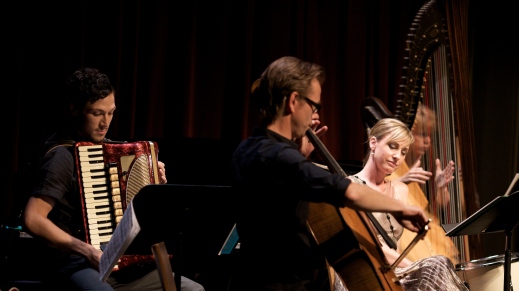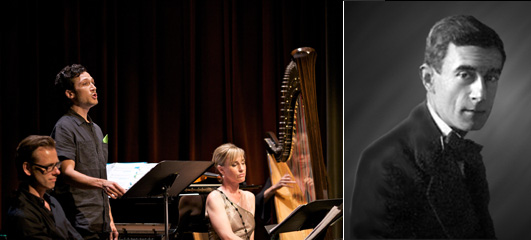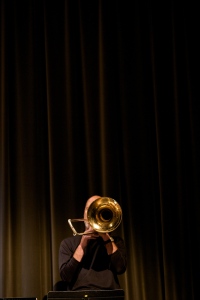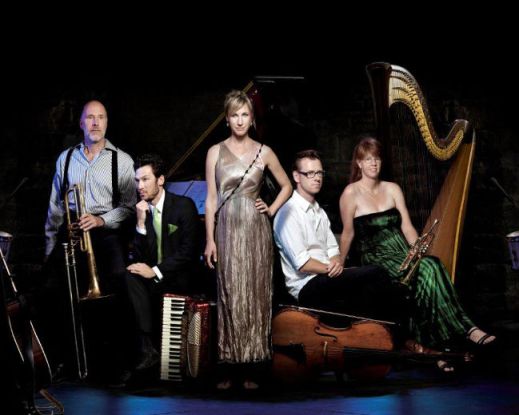Casting Judgment – Tom Allen
The Judgment of Paris is a cabaret based on the lives of the French turn-of-the-20th century composers Claude Debussy and Maurice Ravel. It features music by Debussy and Ravel along with original songs written and performed by the cast: Patricia O’Callaghan, Bryce Kulak, Kevin Fox, Lori Gemmell and your guest blogger and Soulpepper Resident Artist, Tom Allen.
There are true stories and there are stories that contain truths. The former is something that really happened, the latter something that, by telling and retelling, teaches us something true about ourselves.
The lives of the great composers tend to fall somewhere in the middle. Like Hercules or Daedalus or Samson, they seem to have had supernatural powers – using nothing but ideas to build art that has survived where entire empires have failed. But, like the most enduring mythological heroes, they were also flawed. They were drunks or Lotharios or control freaks or syphilitics, driven from genius to avarice to madness and on, to penniless miserable death.
You’d be hard pressed to find two composers who fit more closely to mythical roles than Claude Debussy and Maurice Ravel. That they lived in the same city, at the same time is miraculous enough. They were also polar opposites and represented, on one hand, the apex of the fading Romantic era, and on the other, the emerging core of a new and radically different time. It’s a tale that would make the ancient Greeks proud.
Debussy was the ultimate romantic. His father was a former sailor who married his mistress. They had no money and moved from one squalid flat to another. Mrs. Debussy neglected her five children absolutely. Papa Debussy finally found work as a soldier for the Paris Commune in 1870, but his men deserted him and he was jailed for 18 months. Claude was 9 at the time, and completely on his own, but he was taken in by one Mme Mauté (Paul Verlaine’s harried mother-in-law and, luckily, a student of Chopin) and by the time his father got out of jail Claude had been accepted into the Paris Conservatory.
Soon he was teaching the children of an industrial heiress who lived in a former De Medici palace that spanned the Cher River and had more rooms than all his family’s serial flophouses put together.
Debussy tore through relationships: society ladies, bohemian models… He cleaved to friends while they paid his bills, but abandoned them soon after. He had three fiancés and kept a mistress who outlasted them all, and despite creating an opera (Pelleas and Melissande) that gave France the national voice it had craved for a half-century, he lived most of his life in poverty, debt, or both.
Maurice Ravel was a 20th century composer born just a little too early. He was practical, reserved, driven by craft rather than emotion, and by hearing industry and mechanics as music, captured the impulse of his time with what would later be called minimalism.
Ravel’s family was loving and protective. His father was a playful engineer who, for a time, travelled with Barnum and Bailey’s circus. Ravel’s little brother never stopped calling him by his childhood nickname, Rara, and his mother was a barely literate Gaul who kept such a savage grip on him that he lived with her until he was 42, when she died. Ravel may have been gay, or straight, or asexual. There is no way to know. Even now, 77 years after his death, no trace of any intimate relationship has ever been unearthed.
Ravel managed his money and his music scrupulously and in the 6 decades that followed his life his music earned more than any French musician in history.
The Greek myth of the Judgment of Paris tells of a shepherd who becomes judge in a beauty contest between Love (Aphrodite) and Wealth (Athena). Our version of the story simply changes Paris the shepherd into Paris the city at the dawn of the century, and the rest of the casting – Love and Wealth – takes care of itself.
We include music by both great composers (having a wonderful harpist in the band makes Debussy’s ravishing Dances Sacrée et Profane an obvious choice), plus original songs by Kevin Fox, Bryce Kulak, Patricia O’Callaghan and me.
The Judgment of Paris is at turns funny, tragic, horrifying and, like any good story or myth, it’s true, in every sense. For more information and tickets, click here.




